#hetalia meta
Text
I feel something of a pity when I see how the fandom ignores Egypt's potential.
Just think: dude was the strongest muslim state for a century. Was a shia caliphate. He fought with the Byzantine E. and western european crusaders for the Holy Land - and won. Was a sunni caliphate and the Guardian of Mecca/Medina, third if you count the center in Syria and the center in Mesopotamia/Iraq. Even after the Ottoman conquest, he was always a “special” province, with his own wars, his own government. Almost conquered the Ottoman Empire itself in the 19th century. The Levant, Libya and Sudan have been his bitches for centuries. After all, only Britain, the strongest empire in history, could conquer him, and he was still on his own. During the Cold War, he headed his own bloc of Arab states against the same bloc of Saudi Arabia. And even despite the failure of socialism, Egypt is the most important state in the Arab world, literally the head of the family.
And the fandom sees this guy as a dreamy pyramid fan? They portray him as small, feminine, raised in Turkey lol what???
Dude was literally a beast of sword fighting, one of the centers of islamic mysticism, as well as orthodoxy and major political players. Yes, he himself taught a lot of people and things.
55 notes
·
View notes
Text
ok hear me out on this
remember when fandom creators would take the whole 'england sees things that aren't real' canon and interpret that trait as him having a psychotic disorder?
and now we're saying that's cringe??
like yes it was usually done poorly. making light of psychotic/schizophrenic disorders or framing hallucinations as a silly goofy quirk in a 2012 fandom type of way is ultra ableist.
but when done in a respectful realistic way? there's a lot of potential there for neurodivergent arthur and i actually don't think it's cringe to take things like that and put a more serious spin on them. i think we should explore this more tbh.
btw having psychosis doesn't make you evil or 'crazy' it's more common than you'd assume and i think some of y'all are just ableist
#not the most coherent i had long strenuous day#that man has issues. respectfully#aph england#hws england#arthur kirkland#england hetalia#hetalia headcanons#hetalia meta#tw psychosis
53 notes
·
View notes
Text
a series of (un)related posts
2008:

2009 (??????):
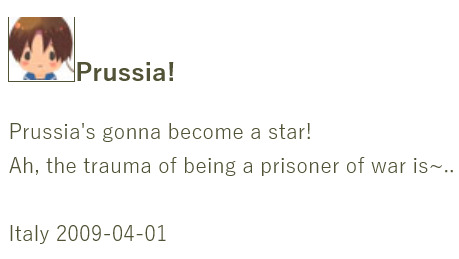

2011:
Not really a good thing for Prussia to be involved with Russia



(left out the part where he goes back to "bragging mode" bc "his little bro is strong so [Russia] doesn’t freak [Prussia] out so much anymore"). he changes his moods so fast i love him.
2013:
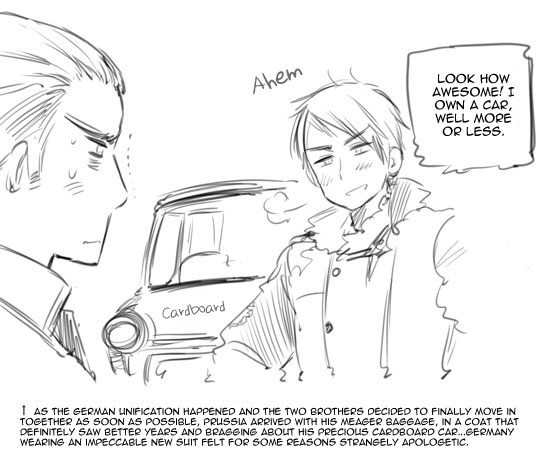
[T/N: that would be the infamous Trabant, I think.]
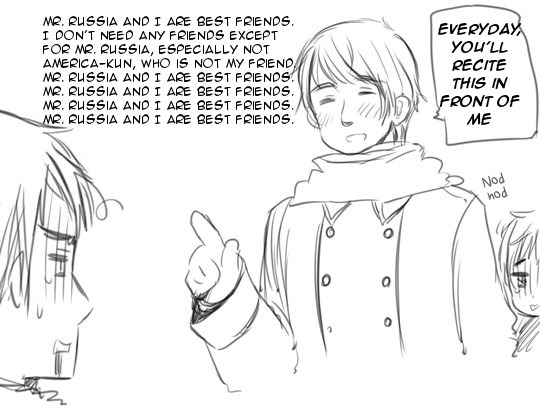
"The friends are increasing, it’s a good thing!"
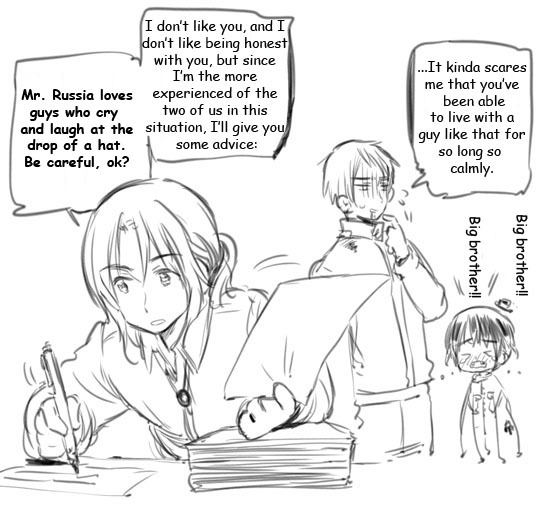
"I want to escape this cold place!"
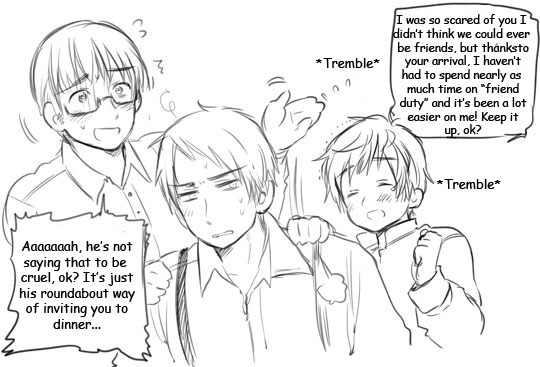
Acting like his seniors.

2015:

#the pain was to transcript everything#prussia=gdr#<-more posts about this in that tag. just scroll for older (better) posts#hws prussia#aph prussia#gilbert beilschmidt#hetalia#hws#hetalia meta#hws russia#hws lithuania#sr. tnddr#bamboo thicket blog
261 notes
·
View notes
Text
i kinda wish himaruya gave kiku long hair in all the pre-meiji era stuff, not because historical accuracy always has to be stuck to rigidly (artistic license is great and fun!)—but because it kinda misses out on the opportunity for some in your face, but very nice symbolism when he gets a Dramatic Haircut and puts on western dress for the first time with the end of isolationism. since the style of long hair for japanese men was partly related to cultural influences from china, and mmmm just so much going on there about what it says about his changing relationship and view of yao—who was in many ways, his mentor for centuries and seen as the prestigious empire to emulate.
#hetalia#hws china#hws japan#but thats what fanart is for#😁#i really like that he otherwise gave canon Yao long hair#hetalia meta#honda kiku#wang yao#hetalia headcanons
201 notes
·
View notes
Text
idea–the nations have some animalistic(not sure if I'm using the word right) features, based on their national animals/animals they are associated with. Or perhaps even being able to shapeshift into these animals.
Romania having fangs, but not because he's a vampire, rather because, they're the fangs of a lynx, and being capable of purring. Also Serbia having the fangs of a wolf. Some nations having eyesight and/or hearing better than humans. Bulgaria's national animal is the lion, so how about Bul having freakishly good eyesight in the dark(probably ro and serb too, and a lot of other nations tbh)? Perhaps his eyes even glowing a little in the night. Maybe England as well, since his national animal is the lion too.
The italies also having wolfish characteristics(Ancient Rome too). America being as strong and fast as the american bison. Russia is also as strong as a bear, probably has some of it's features too.
And sometimes it's a good useful thing, or simply fun when they have the free time to goof off and shapeshift as some animal. But other times...it's simply one more thing reminding them of the fact they aren't human. And humans, don't quite notice it at first, but eventually they do, and it's hard if they want to pretend to be human. Fitting in is terribly hard. For some humans, it's really unnerving and frightening, which sometimes make a nation's mission more hard, and sometimes even emotionally hurt them if the humans are some of their own people (cause like. The people that you personify sometimes being scared of you has got to suck, right?)
#Hetalia#Aph#Hws#Headcanons#Nations#Nationhood#Meta#Hetalia meta#Romania#Bulgaria#Serbia#America#England#Russia#Can you tell i've been thinking about this for a long time???#North italy#South italy#Romano#Italy
21 notes
·
View notes
Text
The American Revolution, in my opinion, is one of the most misinterpreted events both in real life and in the hetalia fandom. It wasn't a revolution based on the rejection of all things English but an assertion of all things English, from Common Law to the (English!!!) Bill of Rights to the Constitution being inspired by the Magna Carta. Hell, even apple pie, the most American thing about this country, is English. And this was a very conscious choice, not something that happened miraculously, so when people say Alfred’s entire ambition in life is to be the complete opposite of Arthur, it doesn't quite make sense to me because that's simply not true (and historically illiterate and disingenuous)!!! The American Revolution in part happened because the colonists wanted to be treated like Englishmen, they believed they were Englishmen who desverved English rights despite half of them not being born in England, and when they understood they weren't going to be treated as such they departed on the hopes of creating a system where they could live as Englishmen in truth!!! Alfred purposefully mirrored himself after Arthur. Did he believe he exemplified/embodied English ideals better than Arthur ever could? Of course he did! But this only further proves my point.
#heavy usage of the word English but i really need to drive this point home lmao#hetalia#hetalia meta#aph america#aph england#alfred f jones#arthur kirkland#american revolution#which was just a continuation of the English Civil War and Glorious Revolution but I digress 🚶♀️➡️
27 notes
·
View notes
Text
I think the universal language thing doesn't suck as much as people think.
Why this is beneficial?
It Doesn't Place Any Language as the Default
On the global sphere languages like English or French are the de facto lingua Franca. This would put people like Feliks or Yong Soo at a disadvantage. Having a default language that isn't one spoken by a nation as their main language makes it so no one has a clear advantage linguistically
Ease of Communication
Okay imagine all of the nations of Africa meet for a meeting. Thousands of languages are spoken in Africa it's an incredibly linguistically diverse continent. Now how should everyone communicate with one another? Should they emphasize a language like Swahili, English, French, or Arabic? This is what they do IRL in the African Union. But as language is an intrinsic part of identity I don't feel all the nations on a continent would really enjoy that.
Now commonly sited drawbacks and how to get past them
Q: What about forcing language on someone as a symbol of power?
A: Alright, I write mainly Eastern Europe and Russification was and is still a thing. Now does a default language mean Ivan can enforce his language on others? No, he can simply choose not to use it as a form of communication. Add the default nation language to Lithuanian, Polish, Ukrainian, and more after the failed January Uprising. The people of the country don't speak the default nation language. So use this as rationale for Ivan to adhere to Russian being a lingua Franca among the nations of the Soviet Union just as it was back then.
Really i see it like how it was with my friend group in highschool. We all spoke English. Yet I had a friend from Indonesia, Japan, The Czech Republic, and multiple friends from Germany. Sometimes the friends from Germany would spend lunch speaking to one another in German the rest of us not speaking a word of it, just chatted with ourselves entertained.
Q: What about my OTP?
A: your OTP can still learn one another's language. They are learning each other's culture that way and that's important. My best friend's family will speak to me in Spanish because they know I have learned it even though they also speak English as well.
Q: why bother learning a language then?
A: Simple, perhaps the default nation language is quite rudimentary and it can only function to get the basics across. The characters can still be motivated or forced to learn a another language.
Q: what about the people?
As stated before the nation default is only used by nation reps. Take this map of the languages of Interwar Poland. Feliks, if he wants to understand all of his people has probably had to learn some of these languages over the years. To this day Lithuania has Polish speaking minorities so he can use Polish with them. If Feliks is in Sejny or Puńsk for whatever reason or in Hajnówka he can use Lithuanian or Belarusian with those people.
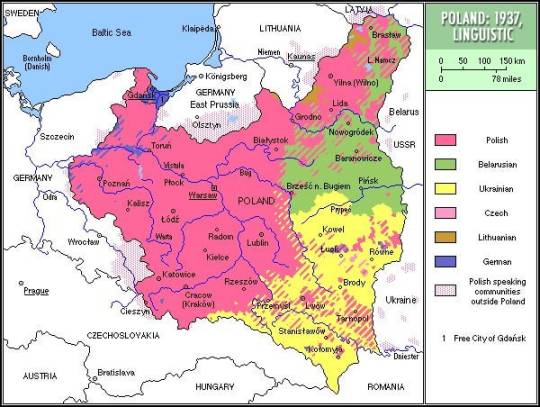
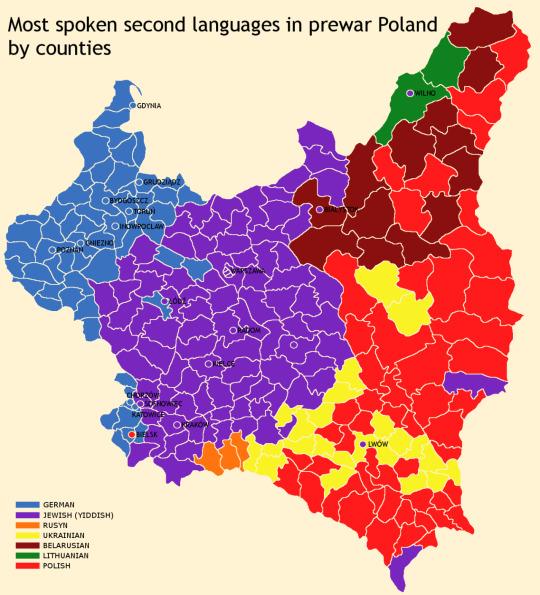
Overall, I don't really care how you go about it this is just my opinion you do you and have fun! 💗
26 notes
·
View notes
Note
How many languages does England know?
Far too many to define, many of them being that blurred area of dialect, pidgin, or creole between languages
He speaks an old form of Brythonic as his first language, then whichever particular ones the Celtic tribes of his land spoke. These languages and dialects are mostly forgotten or all mixed together- a word from one, a phrase from another, an expression from a third- but the earlier Brythonic language still comes to him in dreams sometimes, and the others as dreams of memories related to a particular region or person. The languages and dialects he shared with his brothers are clearer as he would have had practise after the languages themselves died out, but the ones he alone held all those years ago are almost long gone
Aside from these he knows Latin and Ancient Greek, which both once would have been essential. Norman French, obviously, and Norse too- all languages which have melded into English and left their mark. The same can be said for the old Celtic- Latin creole, and the old Anglo-French: remains of his people merging and taking in new waves of immigration.
Old English itself he would still be considered fluent in, if rusty, although some dialects are weaker and the Wessex dialect is strongest (more written text from this one survives compared to the others). This is the same for Middle English, and obviously Early Modern and Modern English he's an old hat
These older languages are becoming weaker the more time goes by and the less he uses them. He can't use or remember perfectly all of his languages, it's impossible to. And although I think nation memories are better than mortals, and overall they are FAR better at learning and remembering language in order to communicate with whoever they claim as their own, there is still only so much time he can dedicate to maintaining a language that no one else ever uses, or remembers. He does not need to keep these linguistic nuances, they are not essential to understand his people, and so they exist either for him and his memories alone, or a few other people. He and Francis are the last speakers of Norman French and Anglo-French. He and his brothers the last Brythonic speakers. He alone remembers the forgotten Cumbric language, or the spoken words of Boudica, and with no one but himself to talk to the language shrinks and grows stale. Still there, but barely. Coming in bursts, or leaving him lost for words
For modern languages, he knows his brothers' languages, athough not all of their branches and forms and he likely has a few centuries of knowledge missing from several of them. He knows modern Welsh, Cornish, Scottish Gaelic and Irish Gaelic, and understands Francis when he speaks Breton.
He's fluent in French, German, Hindi, Spanish, Mandarin Chinese, Japanese and Arabic and, as these are used the most in his life outside of English, he's probably now more comfortable in these than Latin or Ancient Greek which once would have held the same role for international communication.
He's also let many languages slide. He would have once been fluent in modern Greek, and Cantonese, although now he's not. Urdu would have once been great, and although he's good at Portuguese and understands it perfectly, he trips over himself sometimes and might mix it up more with Spanish than he used to. There are many many more too that i'm missing from this section- the man has travelled about and he'll have picked up a good many on his travels to use when he needs to and then forget when he doesn't
121 notes
·
View notes
Note
what was that about gil having dreams about the future? (no pressure!)
Oh anon my beloved thank you so much; I dropped that little tidbit into that post hoping someone would ask about it
The truth is that while it is a strongly held headcanon of mine, it’s something of half a historical in-joke, and half a metanarrative indulgence. I’ll cover both of these respectively, in case you want just the historical reasoning and not so much my deranged meta-analysis on nations, narrative, and metanarrative. With this in mind;
Prussia as Cassandra, A Meta
A brief historical overview
The Old Prussians practiced omen-reading and regarded seers with high regard, which was acknowledged as valid by the Teutonic Knights (when the omens predicted victory in battle, at least) and was practised by both men and women
White Ladies are supposedly ghosts of women who haunt the Hohenzollern family as omens of misfortune and especially as messengers of coming death. Notably, Queen Sophia Louise was once afflicted by a bout of madness in 1709 and dressed only in her white nightgown and having cut herself on some broken glass and screamed at King Frederick I (grandfather of Fritz) that "the plague would devour the king of Babylon". In part due to the White Lady folklore, he took this with serious regard and proceeded to prepare Berlin against the upcoming plague (which very much devastated wide swathes of both Prussia and the rest of Northern Europe)
Bismarck very probably never actually said the famous "damned foolish thing in the Balkans" quote that people like to trot out about the inevitability of World War 1 so I hesitate to include it here as historical fact, but for the purposes of elaborating on the "historical in-joke" half of this meta I will gesture to it as a vague suggestion of an ironic future-vision that, as I will discuss shortly, I think makes a certain degree of narrative sense.
Now, moving on to the narrative background and arguably the meat of this meta:
Narrative analysis
Entire books could and have been written about the depiction of history, and the fictionalisation of history for the purposes of narrative storytelling, especially in regards to the personification of abstract concepts like nation-states and their associated concepts. Unfortunately I cannot afford to go to university so you are getting this post instead.
For the purposes of this discussion strict literal academic historicity is not our goal, but rather HWS Prussia as a narrative construct within the sandbox of Hetalia as a story that involves and adapts history but is not necessarily directly representative of it.
Within this frame of analysis, Prussia as a character is a distinctly weird choice for Himaruya to make: To establish him as an ongoing, extant entity in the modern day is definitely A Narrative Choice to make, and honestly not really one I could personally imagine making. Perhaps it's a lingering result of questionable initial research, perhaps there's some meat to chew on in regards to this.
Prussia's design is one that stands out, compared to the rest of the mostly-naturalistic cast. We have the initial design concept for him depicting him as an older, rugged man, and we also have his very early canon design that depicts him with blond hair and blue eyes. However, the decision was made at some point relatively early on to change his design to be distinctly and notably Not Natural: Some debate has been made about to what degree is he actually albino, but the design is still notable for being distinctly 'set apart' from the other nations.
From there, we have to start asking questions about why this decision was made. My personal first thought was perhaps it was inherently tied to his creation as an "unnatural" state in the form of the Teutonic Knights. Voltaire's popular quote about Prussia not being a nation with an army, but rather an army with a nation might come to mind. However, we have been provided with the designs of the other Orders and they don't share his design traits in favour of their own design language, meaning that line of question falls short.
From there, I think it's not unreasonable to suggest that Prussia was designed - in his final, canon form - with his dissolution in mind. It sets him apart visibly from the rest of the established nations, and fundamentally Others him from the rest of the cast - a similar design concept used with Russia, who is within the canon framework of Hetalia, heavily associated with the sinister supernatural as signaled by his unnaturally coloured eyes.
Therefore, on a narrative level, Prussia's appearance foreshadows his own death, and his death was inevitable from the very beginning.
(Turns out the Calvinists were right, huh?)
With all that in mind, I don't find it unreasonable to take that dramatic narrative irony and apply that inherent 'friction' to the rest of Prussia's story: His narrative is haunted by his own death.
By virtue of his creation and his design (and within the framework of the text, his existence) he is doomed to die, and that singular event ripples back through his narrative almost like a psychic shockwave. Everything he Is points towards The End.
When that End comes, it 'releases' a good deal of that narrative tension. Himaruya has said that he designed Prussia to be something of a villainous character and the dissolution provides the suitable narrative endpoint in that regard. However.
The narrative framework of Hetalia continues, as the history it adapts tends to do, which begins to create a new form of narrative tension due to The Decision to have Prussia continue existing into the 'modern' setting. Himaruya has been incredibly cagey about this and besides the ongoing mystery of The HRE Situation the topic of Prussia's ongoing existence is something he's been noticeably coy about in his discussions and implications of East Germany and the following Reunification, but that's an entirely separate essay from what this one is about.
Fundamentally, I think that Prussia - as a narrative construct - is inherently and on a foundational level tied to his own eventual nonexistence, and the dramatic tension of What Comes After. I think he knows, on some primal, unfathomable level, and rages against it right up until it comes for him and he has to learn how to pick up the pieces of himself, his legacy, and his own narrative.
With that intrinsic narrative irony in mind, I don’t think it is too out there to suggest that he possibly (unintentionally, unconsciously) channels the future-sight that keeps cropping up in Prussian history, as noted above. At least in some form, I think he resonates with the coming End in a way that he cannot fully comprehend or articulate and like the Cassandra of myth there is nothing he can do to warn about or avert the doom that he sees and senses.
Troy could not be saved, and neither can he.
But that's just a theory. A game theor—
If you’ve made it this far, thank you so much for reading! This really got away from me and I really do hope that it's at least somewhat comprehensible.
19 notes
·
View notes
Text
Xenofiction: Fiction focusing on non-humans with non-human perspectives and experiences.
A good rule of thumb is that if the characters can be replaced with super-powered humans, it's not Xenofiction. But it's obviously a tad more complicated than that.
35 notes
·
View notes
Text
Bros, the ideas that circulate in canon and fanon around eastslavic siblings really seem strange to me.
It is strange to expect a japanese man to be well versed in the intricacies of eastern european history of the early and high Middle Ages, but to expect this from an english-speaking fandom (mostly northamerican, let's face it) is also, it seems to me, pointless.
Let me explain. "Kievan Rus" is an artificial construct adopted from russian imperial/soviet historians. Moreover, it’s not just a matter of the name, as, you know, the late Rhomean Republic is called the “Byzantine Empire”, it’s just that there was LITERALLY no such state as “Kievan Rus”. In the space approximately from the Baltic and White to the Black Seas, there were numerous proto-urban and urban settlements of slavic, finno-ugric and baltic (as well as other) tribes, which entered into alliances with each other, sometimes quite strong, but still remained isolated. Of course, it would be disingenuous to say that since the beginning of time the urban educated population did not develop some kind of common identity… for some time.
But if we talk about actually existing cultural regions, determined by geography and economics, then, in fact, it is worth highlighting Northern (Novgorod) Rus' and Southern (Kievan Rus' itself), in a very simplified scheme. One of them was tied to the countries around the Baltic Sea, like the scandinavians, the baltic tribes and northgerman cities, as well as the slavs of modern East Germany. The other constantly encountered nomads, “Byzantine Empire" and, to a lesser extent, the western and southern Slavs (and magyars!). They were never able to truly become a unified state.
Of course, this is a simplification, because in addition to the Rurikids in the North, who subjugated the South and over time moved there (while the south over time began to separate itself, in particular, into the Novgorod Republic), there was a separate center in Polotsk and some others, but it approximately reflects the essence and, if I were asked about personifications, then I would make two separate MAIN personifications for Rus', Novgorod in the North (male) and Kiev in the South (female), which would be the parents of the future Ukraine, Russia and Belarus.
But if you asked me in even more detail, then Belarus should stand a little aside. You know, in fact, historically it is more archaic and “stagnant” than Ukraine in the south and Russia in the northeast. Did you know that lithuanians called belarusians an ethnonym derived from the name goths lol? Plus, genetically and partly culturally, belarusians, like some poles, are closer to the baltic peoples, and not to the rest of the slavs. Taking into account the independent center of statehood in Polotsk, independent of the Rurikids, I would say that Belarus DEFINITELY must be older than Russia (which in the strict sense could only have been born as the Vladimir-Suzdal Principality/North-Eastern Rus' with more ancient names, let’s not clutter the text ) and POSSIBLY older than Ukraine. Perhaps she is an adopted child.
Of course, in reality we have many problems in studying the region for objective reasons, such as a lack of written sources, but… I still love Eastern Europe, these are my roots, after all. And it's really interesting.
#hws#aph#hetalia#hws belarus#hws ukraine#hws russia#aph belarus#aph ukraine#aph russia#hetalia meta#hws kievan rus#aph kievan rus
56 notes
·
View notes
Note
Kind of a strange ask here, but I am writing 2 fics on EngPort: One is about how they would've stayed in contact over the centuries (letters/emails/text) with the development of tech, and I was wondering if you had any particular HCs of Port staying in contact with Eng?
Second is a fic of an NFSW nature where I was like 'what if they just had a really casual conversation about BDSM' and I was wondering how you HCed Portugal's feelings towards it as the number 1 PortEng expert.
Have a good day <3
Not a strange ask at all! And I'm excited to read them already!!!!!
So for communicating over the centuries, @reallunargift has this wonderful hc that Port is really bad at replying, and I really like that, I love to play around with that idea. He sees the letters coming in and just puts them aside with a 'I'll get to it at some point' and just never does, to the annoyance of everyone who knows him.
I think he's better at it after the invention of the telephone, because a telephone call demands a more immediate answer, but then texting comes along and old habits die hard. He'll leave a message on read and just never reply like the old fart he is.
England on the other hand is the master of speedy replies, which makes for a very chaotic communication between these two :D
But if England truly wants to speak with Port he's learned that he needs to either get him on the phone or go to him personally, otherwise he'll just frustrate himself.
As for the second part of the question, well, first you flatter me darling 😌, but as for BDSM, I think they don't go into it very often with each other, but when they do it scratches a very particular itch because their (rebuilt) trust runs so deep. The vibe I get from them in terms of BDSM is that of a couple who has been together for so long. It's more a well worn off practice than the exciting novelty of it, you know? It's knowing and trusting someone so much that they just go 'tonight I want this', and the other one goes 'oh sure, let me run to the drugstore then bc we're almost out of lube', something like that.
As for kinks, it's my personal hc that Port has a gigantic almost unexplored daddy kink he stumbles into every once in a while, but never acknowledges. And England is very much a praise kink kinda guy.
What are your hcs on this? I'd love to hear what you think!
23 notes
·
View notes
Text
buncha quotes from over the years
History Copy Book no.2 (2015):
He will be living with Germany and not doing much for a while still, but even if he disappears, he would be happy knowing that his younger brother has inherited all his knowledge and awesomeness.
2013/2014 Halloween Comic – Page 5:
"I'm happy to mess around even for just a little while. When I'm at home by myself, I start thinking deeply about my own existence like a little bird (...)"
"Most of the work is done by my super competent little brother. Meanwhile, I'm reading books with the speed of four in one day and effectively becoming a genius!"
Cleaning Mr. Prussia – Germany (Aug 31, 2010)
GER: Since the unification until now I’ve done everything by myself.
GER: This kind of thing is no problem for me.
PRU: Don’t overdo it!
GER: Ah…
PRU: Not just with this, historically speaking too, Germans are quick to overreach themselves!
PRU: You’re not alone.
PRU: Me and Saxony and Bayern… and Brandenburg and then there’s, um, Hessen and Holstein…
GER: It’s ok, I got it, I got it.
PRU: Don’t forget that all your older bros are with you!
GER: Yeah…
GER: You’re right…
September 4, 2010:
What are Germany’s brothers other than Prussia doing?
Maybe they retired, maybe they disappeared, something like that. They are all connected to current Germany as they were all passing the baton from one generation to the next.
It’s a Treasure Box of Countries (2011):
Usually, when the culture or the country’s personality dies/disappears, the country would gradually disappear or entrust him/herself to the country that takes over him/her.
There are also cases that him/her is not a country but continues to live leisurely as a representative of a region.
Hetalia World☆Stars – Chapter 436 (July 2022)
"You won't won't disappear if you put your heart into it!"
"We [nation-people] can come into existence from anywhere... As long as we have the will to become independent..."
last one added so this isn't a complete a bummer... just kidding: BOOM! Read Private Concert (October 31th, 2014), and re-read the quotes later.
#hetalia meta#sr. tnndr#hello from the queue#“why are you like this?” read my about!#gilbert beilschmidt#bamboo thicket blog#hws prussia
12 notes
·
View notes
Note
When it comes to personifications, what do you think are the factors that cause a nation to have a “modern” form derived from an “ancient” personification (i.e. Greece and Ancient Greece, Egypt and ancient Egypt)? I mean, I get that it may be an inconsistentency or creative choice done by Himaruya, but how is it possible for other older nations to manage to live for so long without producing a “modern heir” to replace them in the present day (i.e. China, Japan, Korea, India, Mongolia, etc.)?
interesting question! i definitely agree this is something inherently subjective. there isn’t really a singular way of interpreting the complexity of history, let alone how we’d transpose that history onto the helltalias and their lifespan. at least for me, i rationalise some of it in relation to historiography and dynamics of political-cultural contiguity, such as with how Himaruya takes opposing approaches for China and Rome (whom i will focus on in this ask).
for China (aka my great-grandpa): in terms of history, i want to first emphasise that all cultures change; it isn’t a perfectly continuous, unbroken 4,000 year old civilisation, even if we often like to trace Chinese history right back to the ostensible Xia dynasty. there are some elements that have endured for a very long time (like the writing system)—but there were also periods of political disruption very similar to the fall of Rome (and one can argue Rome endured in many ways). however, in terms of melding it to hetalia canon—Yao being old as balls fits quite nicely with the ‘dynastic cycle’ historiography of China—that Chinese history is an unbroken succession of dynasties. Which is flawed actually, but which has tended to dominate perceptions of Chinese history all the same. ergo—‘the empire long divided must unite’, or the thought of the first emperor ‘uniting China’ (as opposed to ‘conquering a vast empire stretching from the north all the way down South to Vietnam and other non-Han ‘Baiyue’ tribes, and Sinicising dozens of different nations that had some similarities with how conquered European and Middle Eastern/North African regions ‘became Roman’).
to me, Yao being extremely old also fits with the way Chinese cultural influence has dominated in the region in terms of influence on material culture, philosophy and language. Like, in the Confucian hierarchy, age = prestige. He sees himself as the great empire and well spring of civilisation (humble? nah, he’s rather arrogant). He’s older than Kiku and Yong-soo, and likes to assert he is older than Lien (Vietnam) which she contests lol. With Kiku especially, I see a very long-running mentor/protege dynamic between them that has at times turned into an ‘ambitious apprentice backstabs his master’ relationship even before the modern era (i.e Toyotomi Hideyoshi’s attempted invasion of Ming China). There are also certain cyclical elements in Chinese culture; like China was historically influenced by Buddhism that came via India and its concepts of reincarnation. So, he dies but he comes back all the same, no matter if it’s in a different form (kingdom to empire to republic). as i headcanon him, there’s a mix of calm (i will endure and wait for spring to come again) but also sometimes spitefulness lol (i’m not dead yet, fuckers).
for Rome: i do headcanon that the Italybros are his sons not grandsons. when it comes to the historiography and cultural perceptions of it, there’s a lot of thought about ‘the fall of the (western) roman empire’ and in terms of political continuity, yes it is fairly clear that the roman empire is no more. historiographically, there’s a sort of linearity to how people have perceived it too: a dramatic rise and fall, beginning and ends. you have people like Petrarch calling the medieval period the “dark ages”, in contrast to the “light” of Rome and the rest of classical antiquity. this is something that most medieval historians today won’t agree with (incl my old professor haha who was a specialist in women’s medieval history)—the parts of Europe (and MENA) that made up the old Roman Empire sure as hell didn’t stand still for a thousand years until the Renaissance; it was a period of cultural developments and not simply darkness and ignorance. but, in terms of transposing it to hetalia—i kind of think Roma being dead fits nicely with 1) the way people have perceived the history of Rome (rise and fall) 2) the medieval developments— all the new European states (and some older ones) emerging from the shattered remnants of the empire, all of them changed by Rome in some ways (Latin --> different Romance languages.) in contrast to China, i guess reincarnation is less of a concept in the Roman pantheon or in Christianity.
i think there’s also a sort of ironic poetry to it, when the fall of Rome is put in context of larger imperial and global history. Rome becomes this mythical figure who haunts the imagination of the European personifications precisely because he’s dead— the towering patriarch who is the model of a grand maritime empire that all of them that used to be Roman colonies/provinces strive for in the 15th century onwards. Like, the Spanish empire had a motto of “further beyond” (plus ultra). In the Aeneid, Jupiter is said to grant the Romans “empire without limit” (imperium sine fine). Even England, where there was this duelling narrative of lionising Boudica (the Iceni queen who fought the Roman conquerors and burned Roman London the ground) and longing to be as great as Rome (there’s a caption on a Victorian-era statue of Boudica in London saying “regions Caesar never knew / thy posterity shall sway”. “Britannia” itself as a name for the UK is ofc from Roman rule. so when it comes down to it, i guess it really is a creative choice by Himaruya (and ourselves). and for me, it’s not just about Rome and China (or any other nation’s) own history but also thinking about historiography (i.e how that history is understood, in terms of dynastic cycles or rise and fall) + relationship with other characters.
#hetalia#hetalia headcanons#hws china#hws rome#aph china#aph rome#hetalia meta#also i am a romechu shipper lol and i guess i am here for the#vibes of Yao remembering a world long gone
105 notes
·
View notes
Note
Your right about RusAme & FrUk
I've been in the fandom since 2012 and those where the only ships I was into at the time. Things have sure changed now but it still similar. Some RusAme fans have grown up and stuck around (me) which is why I think I see more domestic content then before, but immaturity and maturity still divides the groups.
RusAme also does have a lot of adult creators but they are a minority. I think most of them would also agree to this as I've even seen some call themselves immature. I'm also no beacon of maturity myself, which is probably why I sit between the two.
I have also met a lot of fans who've been abused and those who wanted to move on really enjoyed FrUk and those who couldn't move on were into RusAme. That doesn't really change much about the immaturity argument because it's still apart of that reason for sticking to one over the other. It's mostly the difference between people's mindsets. FrUk fans want something good, better then what's currently possible for them and RusAme wants something messier and worse but somehow works. I know some adults into RusAme have had some horrific relationships but they still read it. I've had some real tough ones but I never really think about it when I read or see RusAme content so I don't know how much it's correlated.
I feel like someone in the mental health field could have a field day with Hetalia fans over this stuff because now you have me analyzing myself over my interests.
oh, RusAme does have some great adult creators, especially artists! come to think of it, I think there are plenty of adult artists who ship RusAme; I think the age disparity is in the writers. you make a lot of really good points here though, especially for people who have been through manipulative relationships and don't find RusAme as enjoyable anymore.
Also something that didn't occur to me - and is likely a much smaller factor than the others- about fewer adults shipping RusAme may be the current political climate. like.... right now, the country of Russia is a mafia/pariah state hellbent on a very, very public and highly visible genocide. US-Russia tensions are the worst they've been since Peak Cold War, and it's not sexy, it's terrifying. and that's just... it's really hard to indulge in the escapism of hetalia when that's going on in the background. like literally every time I reblog something with hws Russia, I think of my friend in Kyiv. every single time, without fail. and suddenly RusAme isn't really cute to me anymore, because then I wonder about our friend fighting in Donbas and how I haven't heard anything about him since March.
and you may say that, well, that only started in 2022... but it didn't. this is definitely the most visible it's been recently, but Ukraine started in 2014, and I remember that vividly because it felt a bit weird back then too. I also remember Syria and Chechnya and even Georgia somewhat. and as interesting of a character as Ivan is, the irl backdrop right now is that Putin has been using the Russian state to commit genocide for the past two decades. and by no means am I shaming anyone who does engage with hws Russia content - I still do it. but man, am I aware.
43 notes
·
View notes
Text
People often ponder on the role that anthropomorphic nations play in canon, and often times reduce them to unimportant burdensome figures, that politicians and government cast to the side so that they stay out of trouble like small children but in my mind they are more than that. Humans are so easily given to flights of fancy and impossible imaginings that they fervently worshiped deities of their own making to explain natural phenomenon (why the sun rises and sets, why it rains and storms, why sometimes the earth might shake) that if ever there was a reality where immortal beings that encompassed the spirit of the nation came to be, humans in their passionate nature, would worship them. So my headcanon is that in this universe, a nation is a god (or akin to a god), with all the storied pomp and tragedy and comedy of the Greek/Roman pantheon. The nations made flesh are exalted by their people. Revered and reviled in equal measure, the only way a god can be.
#you have a timeless ancient being with superhuman strength and incredible knowledge#and you DONT use then to your advantage in the modern world? you DONT worship them in the old? they aren't your pride and glory?#that's not how humans are im afraid 😭#hetalia#hetalia meta#hetalia headcanons
30 notes
·
View notes